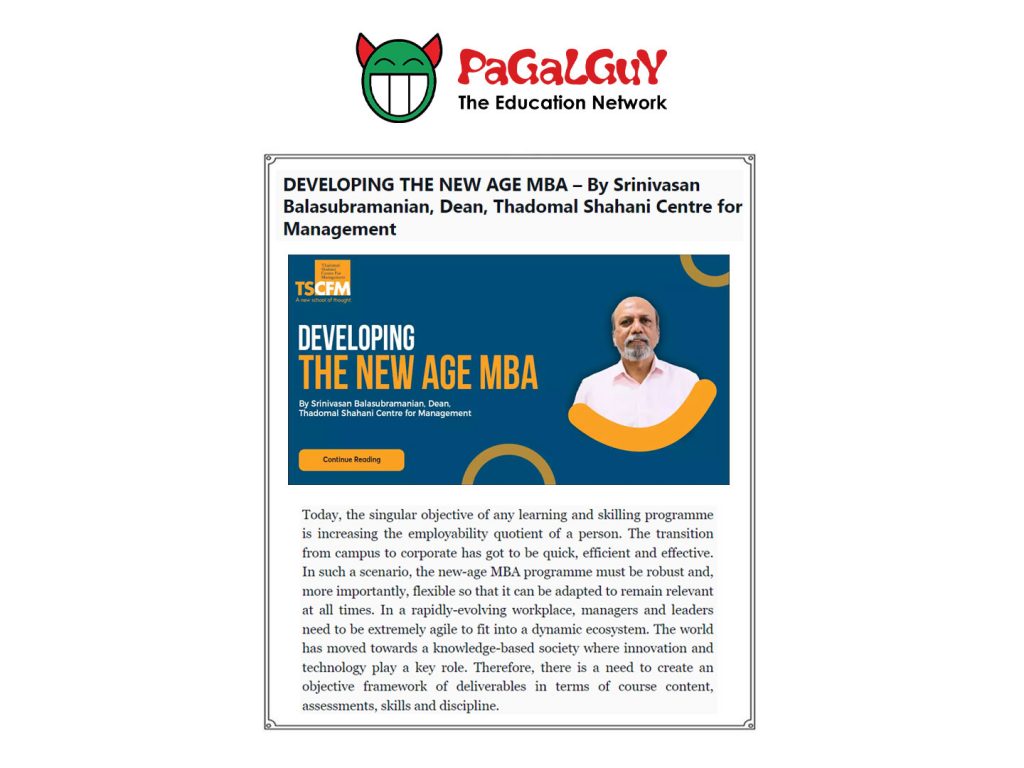Search
Developing the New Age Era - By Srinivasan Balasubramanian, Dean, TSCFM

I Keep six honest serving-men
(They taught me all I knew);
Their names are What and Why and When
And How Where and Who.
– Rudyard Kipling
The above poem deals with curiosity and the willingness to learn continuously. The six honest men are questions that learners must ask to ensure a complete understanding of a particular topic and to unleash their power of imagination. This is the basic approach to the new-age MBA. In a VUCA world (Volatile, Uncertain, Complex, Ambiguous) there are a whole lot of macro and micro issues, and a student must utilise all their mental faculties and find appropriate solutions.
To be Relevant
Today, the singular objective of any learning and skilling programme is increasing the employability quotient of a person. The transition from campus to corporate has got to be quick, efficient and effective. In such a scenario, the new-age MBA programme must be robust and, more importantly, flexible so that it can be adapted to remain relevant at all times. In a rapidly-evolving workplace, managers and leaders need to be extremely agile to fit into a dynamic ecosystem. The world has moved towards a knowledge-based society where innovation and technology play a key role. Therefore, there is a need to create an objective framework of deliverables in terms of course content, assessments, skills and discipline.
New-Age Skills
The real world is tricky and disruptive, and handling any given situation effectively would require a combination of new-age hard and soft skills. While many of the current MBA programmes have evolved in terms of curriculum, specialisation and mode of delivery, which is through case studies, simulations, and in-class activities, there is a need to develop deeper industry-academia partnerships that can help foster mentorship, capstone projects and subsequent placements. The bedrock of the new-age MBA will be research, which will play a key role in finding solutions for the many challenging global problems. Every MBA programme must, thus, emphasise on hands-on training so that students can devise robust solutions to the world’s larger problems.
Furthermore, below are some of the other aspects that need to be salient features of the new-age MBA programme.
1. Introduction to India: India is a unique country with countless paradoxes in terms of socio-cultural and economic dynamics. Hence, a preface about India can help students to understand the basic functioning of the Indian economy and outline the issues faced by the country on the political, economic and social front.
2. T- shaped approach to curriculum development: While we have been successful in covering the horizontal line that represents the inclusion of cross-discipline competencies into curriculums, with subjects such as technology in management, entrepreneurship, finance in decision-making, operations management, data analytics, business modelling, digital competencies and time management being taught, we also need to focus on the vertical line. The vertical line represents deep specialisation and expertise in a particular field such as marketing, finance and HR; we need to focus more on this so that we have people with subject specialisation and expertise as opposed to having too many generalists.
3. New-Age skills: It is imperative to teach problem-solving techniques and critical thinking to enable students to solve the complex issues faced by organisations today. This can be done through games, quizzes and other classroom activities. Furthermore, students also need training in sharp presentation and communication skills and should be taught to seamlessly handle digital tools and social media. This is especially important when it comes to leveraging platforms such as LinkedIn for professional development.
4. Providing project management skills: To teach students to manage deadlines and optimise their resources to complete projects on time is an invaluable skill in today’s hyper-competitive business world.
5. Mentorship programmes: Unconventional mentorship programmes akin to the guru-shishya (teacher-disciple) model, where the mentor is an enabler as well as a facilitator, helping the student to attain greater knowledge and develop their powers of logical thinking and judgement, can be immensely beneficial for young minds to unleash their full potential.
6. Evaluation: Methods of evaluating students’ progress through group and individual projects, presentations and dissertations can enable them to develop a research bent of mind.
7. Environment: Climate change is no longer a matter of debate but a reality that the world has to deal with and help mitigate. Hence, there is a need to give due weightage to the ‘impact on environment’ factor in project planning and execution.
8. Leadership Sessions: A regular session, on impactful leadership across all four semesters that emphasises the need to be a leader with a difference, can help students to cultivate necessary leadership skills early on.
Our world is ever-changing and the challenges of the future are going to be daunting yet thrilling. And from an economic perspective, we cannot know with certainty which industries will survive and which will perish. But through adequate training, we can prepare students to be future-ready for a brave new corporate world.
Read Full Article: https://www.pagalguy.com/articles/developing-the-new-age-mba-by-srinivasan-balasubramanian-dean-thadomal-shahani-centre-for-management
